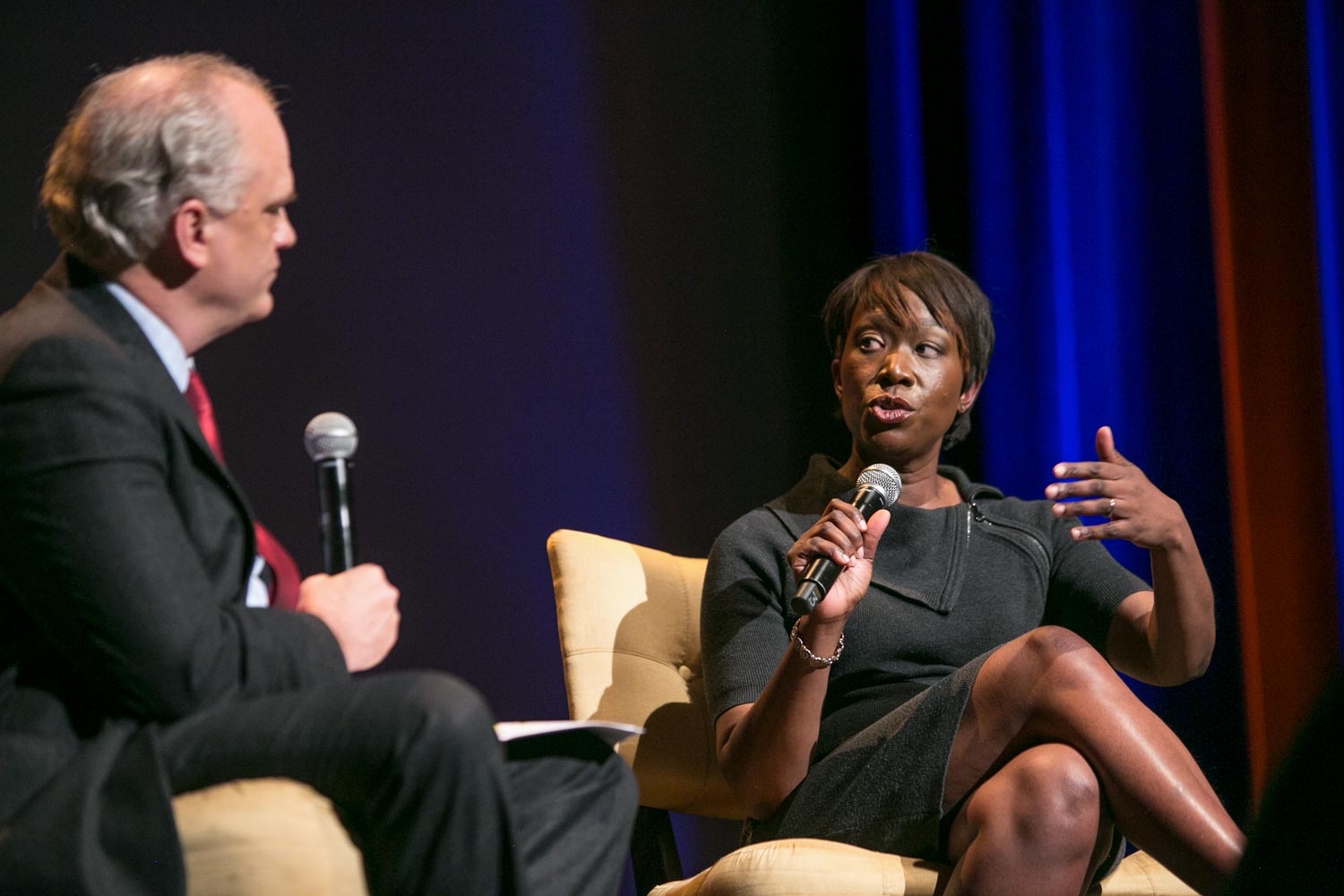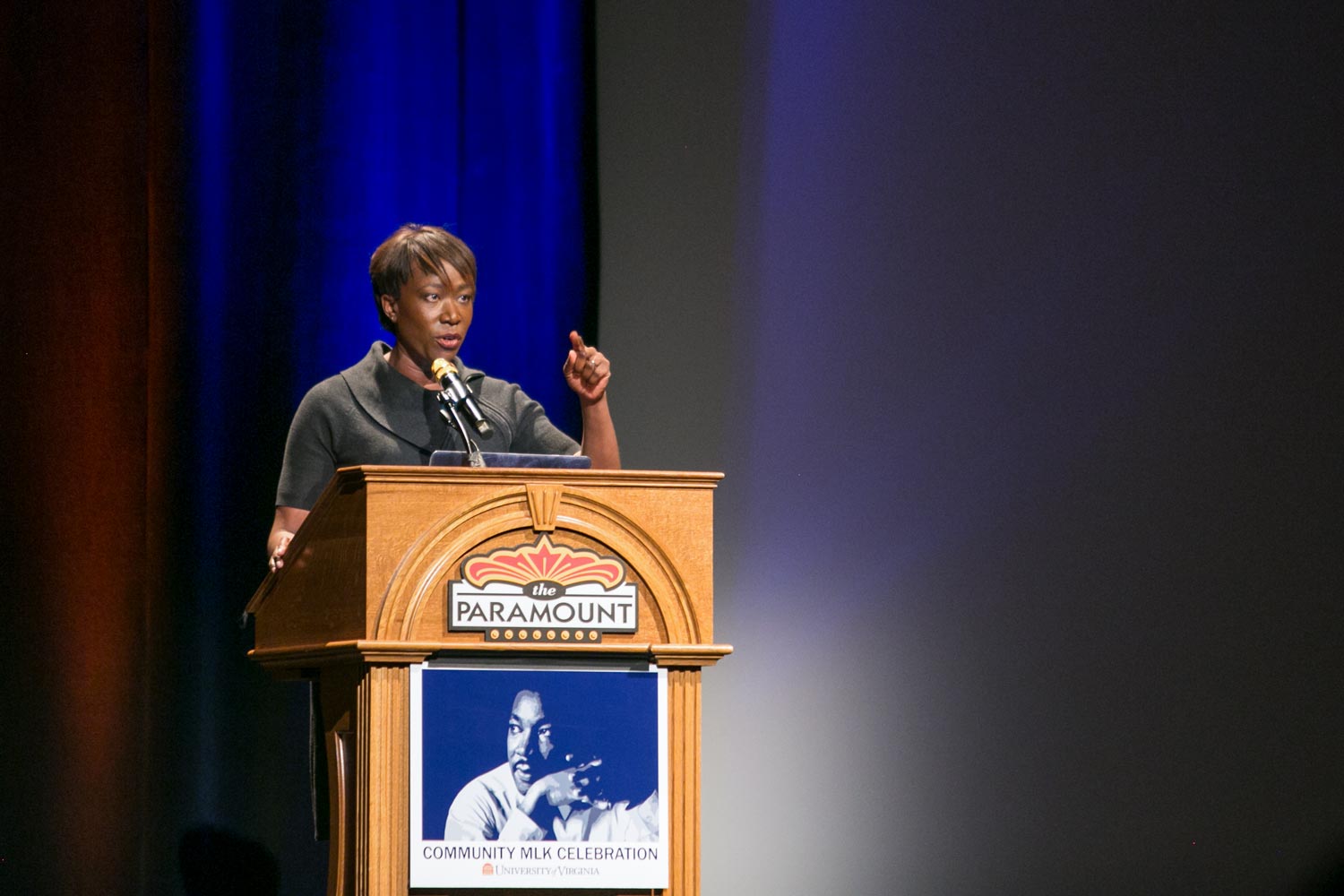Joy Reid, a national correspondent for MSNBC, informed, challenged and encouraged a full house at the Paramount Theater Tuesday night with her remarks as keynote speaker of the University of Virginia’s Community Martin Luther King Jr. Celebration.
Moderator Douglas Blackmon, director of public programs at UVA’s Miller Center and executive producer of “American Forum,” led a lively conversation with Reid after her address, calling her “the smartest woman in television.”
The audience gave her a standing ovation when she came out to the lectern, as well as at the end of her speech.
Reid, host of “AM Joy” and “The Reid Report” on MSNBC, analyzed the violent events in Charlottesville in August, brought up events from 50 years ago that marked 1968 – the year King was assassinated – and compared the public behavior of several past presidents to that of President Trump.
She reminded the audience that many people thought “America was going to hell around 1968,” listing issues such as the growing opposition to the Vietnam War and the civil rights marches that King led, the raised fists of black athletes at the summer Olympics and the assassination of Robert F. Kennedy, as well as King.

After Reid’s prepared remarks, Douglas Blackmon, left, director of public programs at UVA’s Miller Center, questioned her about public distrust of the media, among other topics.
Even so, some things in 1968 broke new cultural ground, she said, listing the TV show “Star Trek” airing the first onscreen interracial kiss, between Capt. Kirk and Lt. Uhura; the movie “Guess Who’s Coming to Dinner,” featuring an interracial couple, portrayed by Sidney Poitier and Katharine Houghton; the release of the Beatles’ “White Album”; and Apollo 8’s beautiful pictures of the Earth from space.
Reid said the divisive rhetoric of Alabama Gov. George Wallace in his 1968 presidential campaign incited the same kind of emotional responses that Trump’s campaign speeches did in 2016.
She voiced concern over a loss of dignity in the Oval Office, pointing out that President Lyndon B. Johnson, who was known to be vulgar in private, was dignified in public.
As he worked on civil rights legislation beginning in the late 1950s as a Texas Democratic senator, Johnson was willing to challenge Southern Democrats’ racist policies – and she encouraged people to challenge their loved ones and others expressing racist views.
Trump’s initial refusal to condemn the white supremacists and neo-Nazis who swept into Charlottesville Aug. 11 and 12 will be a defining moment in his presidency, she predicted, and “Charlottesville will matter as a flashpoint defining this era.”
In talking with moderator Blackmon after her address, Reid said “people latch onto what’s emotionally immediate instead of addressing history and seeking to understand why things are the way they are.”
“America has this heroic narrative, that it always has to be seen as the good guy,” instead of admitting its problems, she said.
Blackmon asked about the “relentless assault” on the mainstream media, increasingly viewed as taking sides. Reid said she worries about people only trusting media that reflect what they believe.
“Without general trust in the media and the facts, it really could be dangerous,” she said, because if the U.S. faced some terrible threat, who would the public believe?

Reid turned to King’s legacy to talk about how to respond to the white nationalist and other backlashes in America.
Care as much about other groups fighting for equality and justice, she said. What academics call the “intersectionality” of race, class and gender, she described as a moral view of compassion.
Be aware of the power of rhetoric, she suggested; it doesn’t apply only in victory. Obama, she offered as an example, first used his “Yes, We Can” slogan in a speech after losing the New Hampshire primary.
She advised the crowd to exercise patience in working for social justice. King’s patience and ability to endure criticism ultimately yielded results. “Don’t let temporary defeat make you defeated,” she said. “History is full of slow change.”
Media Contact
Article Information
January 24, 2018
/content/journalist-offers-advice-divided-nation-mlk-celebrations-keynote-address

